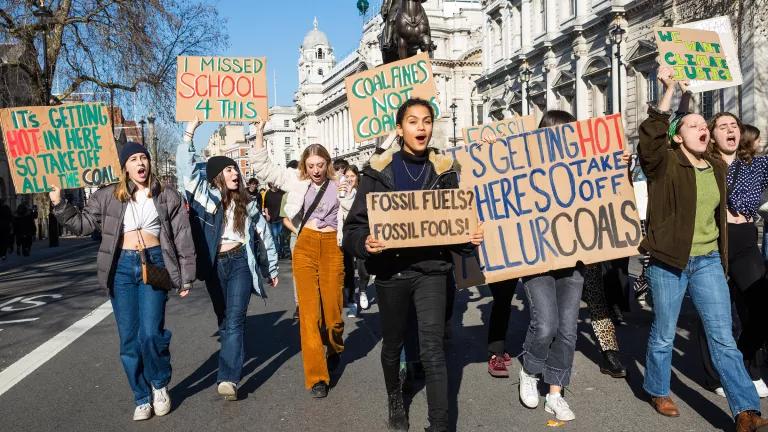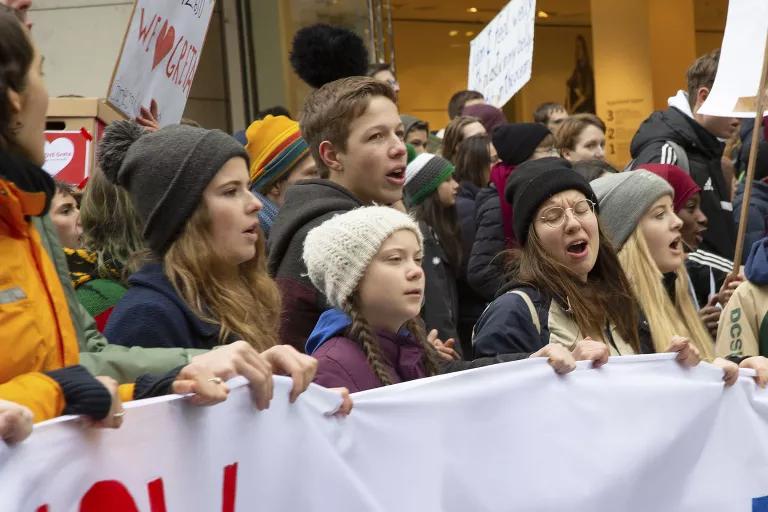The Youth Climate Strike Is Exactly What the Planet Needs Right Now
On March 15, students around the world will walk out of their schools and speak as one, demanding climate action—and our attention.

Thousands of students take part in a Youth Strike 4 Climate in London, February 15, 2019.
“Adults keep saying, ‘We owe it to the young people to give them hope.’ But I don’t want your hope . . . I want you to act as you would in a crisis. I want you to act as if the house was on fire. Because it is.”
—Climate activist Greta Thunberg, speaking to members of the World Economic Forum in Davos, Switzerland, in January
Young and foolish, young and naive, young and impressionable, young and inexperienced, young and idealistic. For all of our culture’s fetishizing of youth, the list of demeaning or diminishing adjectives that often get paired with young is a long one. And all of them are meant to reinforce the basic idea that while youth may confer the desirable qualities of strength and vigor and beauty, wisdom is something that comes only with age.
But right now, all over the world, young people are calling into question the supposed “wisdom” of their elders who would address climate change as something other than the existential threat to humanity that it is. They want to know: Given how little time we may have left to tackle this problem, is it really wise to be approaching this issue with pragmatism and patience? To be preaching incrementalism and compromise? To minimize the concerns of schoolchildren worried about the poisoned environment they have inherited by patronizing and insulting them when they’re begging for help?
Next Friday, March 15, hundreds of thousands of young people on six continents will take to the streets in an act of solidarity and resolve. Their goal is to deliver a message to the adults who run the world’s governments, businesses, and other institutions: Your time is up. Further delay is unacceptable. If you don’t act now to curb emissions and lower global temperatures, you are consigning the next generation—and all future generations—to miserable lives on a planet marked by ever-decreasing habitability.
The Youth Climate Strike scheduled for March 15 is an outgrowth of #FridaysForFuture, an ongoing campaign for climate awareness led by 16-year-old Greta Thunberg of Sweden. Thunberg began making international headlines last summer when she launched a solo strike in her home country, sitting in front of the Swedish Parliament House every school day for three weeks to protest what she saw as her government’s climate inaction. She then returned to school for four days a week, limiting her protests to Fridays. But by that point, many other young people inspired by Thunberg’s dedication had taken up her cause in their own countries.
In Belgium, more than 30,000 students walked out of class recently in just one of a weekly series of protests against their country’s climate policy, which they believe to be woefully out of step with the emissions reduction goals set forth by the Paris Climate Agreement. Their demonstrations, which have earned the support of Belgium’s King Philippe, ultimately led to the resignation of a climate minister who had insinuated, without evidence, that the protesters were political pawns acting under orders from mysterious, unspecified powers-that-be. Since Thunberg began her campaign, students have risen up to demonstrate (and roil the political waters) in more than a dozen other countries, including Australia, Ireland, the United Kingdom, Poland, Germany, and Canada.

Here in the United States, the same youthful energy has already resulted in some remarkable examples of composed, informed kids speaking truth to power. Alexandria Villaseñor is a 13-year-old New Yorker who has taken advantage of her proximity to the United Nations building to camp out in front of it for hours each Friday. Haven Coleman, 12, has demonstrated similarly in front of government buildings in her hometown of Denver. And the Sunrise Movement has shown itself to be utterly unafraid to confront Senate leaders on both sides of the aisle. These young activists have quickly become some of the most vocal and visible champions of Representative Alexandria Ocasio-Cortez and Senator Edward Markey’s Green New Deal, which many of them see as a necessary component of American climate policy going forward.
On March 15, these various independent movements—some as large as 30,000 strong, some as small as a single, determined person holding a cardboard sign—will fuse for the day, forming an impossible-to-ignore international coalition. Through their actions, its members will be broadcasting and amplifying to the entire world the message that Greta Thunberg delivered to the assorted billionaires, government officials, and thought leaders at Davos in January: Our house is on fire. Treat this situation like the emergency that it is.
These protesters will do so at the risk of being labeled foolish, naive, impressionable, inexperienced, and idealistic, the labels their elders have always used to make young people doubt their own power. But they don’t seem too concerned about that. They have much bigger things to worry about, and far more important matters to discuss. The rest of us would be wise to stop talking for a moment and listen.
This article was originally published on onEarth, which is no longer in publication. onEarth was founded in 1979 as the Amicus Journal, an independent magazine of thought and opinion on the environment. All opinions expressed are those of the authors and do not necessarily reflect the policies or positions of NRDC. This article is available for online republication by news media outlets or nonprofits under these conditions: The writer(s) must be credited with a byline; you must note prominently that the article was originally published by NRDC.org and link to the original; the article cannot be edited (beyond simple things such grammar); you can’t resell the article in any form or grant republishing rights to other outlets; you can’t republish our material wholesale or automatically—you need to select articles individually; you can’t republish the photos or graphics on our site without specific permission; you should drop us a note to let us know when you’ve used one of our articles.

How to Make an Effective Public Comment
Should I Become a Poll Worker?
When Customers and Investors Demand Corporate Sustainability
How to Make an Effective Public Comment
Should I Become a Poll Worker?
When Customers and Investors Demand Corporate Sustainability
How to Make an Effective Public Comment
Should I Become a Poll Worker?
When Customers and Investors Demand Corporate Sustainability
How to Make an Effective Public Comment
Should I Become a Poll Worker?